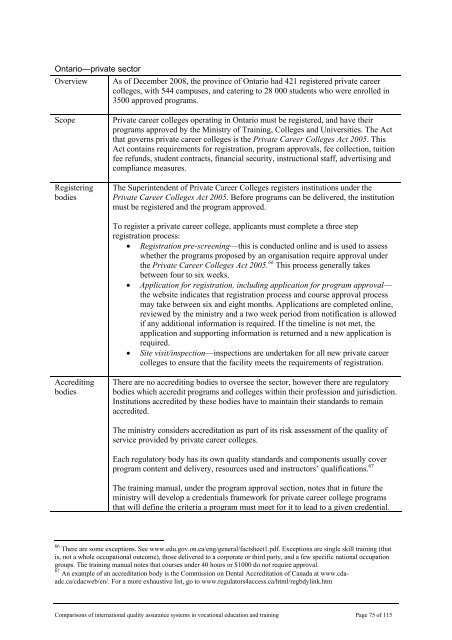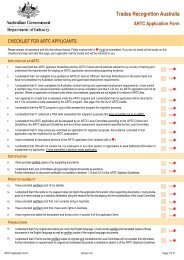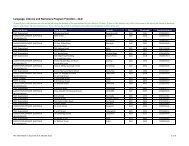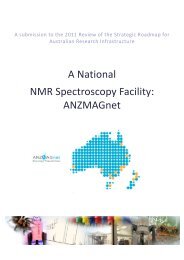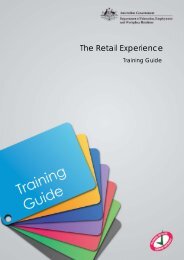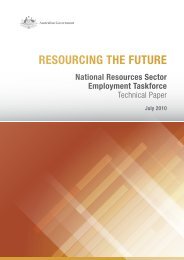Review - Department of Innovation, Industry, Science and Research
Review - Department of Innovation, Industry, Science and Research
Review - Department of Innovation, Industry, Science and Research
You also want an ePaper? Increase the reach of your titles
YUMPU automatically turns print PDFs into web optimized ePapers that Google loves.
Ontario—private sector<br />
Overview As <strong>of</strong> December 2008, the province <strong>of</strong> Ontario had 421 registered private career<br />
colleges, with 544 campuses, <strong>and</strong> catering to 28 000 students who were enrolled in<br />
3500 approved programs.<br />
Scope<br />
Registering<br />
bodies<br />
Private career colleges operating in Ontario must be registered, <strong>and</strong> have their<br />
programs approved by the Ministry <strong>of</strong> Training, Colleges <strong>and</strong> Universities. The Act<br />
that governs private career colleges is the Private Career Colleges Act 2005. This<br />
Act contains requirements for registration, program approvals, fee collection, tuition<br />
fee refunds, student contracts, financial security, instructional staff, advertising <strong>and</strong><br />
compliance measures.<br />
The Superintendent <strong>of</strong> Private Career Colleges registers institutions under the<br />
Private Career Colleges Act 2005. Before programs can be delivered, the institution<br />
must be registered <strong>and</strong> the program approved.<br />
To register a private career college, applicants must complete a three step<br />
registration process:<br />
• Registration pre-screening—this is conducted online <strong>and</strong> is used to assess<br />
whether the programs proposed by an organisation require approval under<br />
the Private Career Colleges Act 2005. 66 This process generally takes<br />
between four to six weeks.<br />
• Application for registration, including application for program approval—<br />
the website indicates that registration process <strong>and</strong> course approval process<br />
may take between six <strong>and</strong> eight months. Applications are completed online,<br />
reviewed by the ministry <strong>and</strong> a two week period from notification is allowed<br />
if any additional information is required. If the timeline is not met, the<br />
application <strong>and</strong> supporting information is returned <strong>and</strong> a new application is<br />
required.<br />
• Site visit/inspection—inspections are undertaken for all new private career<br />
colleges to ensure that the facility meets the requirements <strong>of</strong> registration.<br />
Accrediting<br />
bodies<br />
There are no accrediting bodies to oversee the sector, however there are regulatory<br />
bodies which accredit programs <strong>and</strong> colleges within their pr<strong>of</strong>ession <strong>and</strong> jurisdiction.<br />
Institutions accredited by these bodies have to maintain their st<strong>and</strong>ards to remain<br />
accredited.<br />
The ministry considers accreditation as part <strong>of</strong> its risk assessment <strong>of</strong> the quality <strong>of</strong><br />
service provided by private career colleges.<br />
Each regulatory body has its own quality st<strong>and</strong>ards <strong>and</strong> components usually cover<br />
program content <strong>and</strong> delivery, resources used <strong>and</strong> instructors’ qualifications. 67<br />
The training manual, under the program approval section, notes that in future the<br />
ministry will develop a credentials framework for private career college programs<br />
that will define the criteria a program must meet for it to lead to a given credential.<br />
66 There are some exceptions. See www.edu.gov.on.ca/eng/general/factsheet1.pdf. Exceptions are single skill training (that<br />
is, not a whole occupational outcome), those delivered to a corporate or third party, <strong>and</strong> a few specific national occupation<br />
groups. The training manual notes that courses under 40 hours or $1000 do not require approval.<br />
67 An example <strong>of</strong> an accreditation body is the Commission on Dental Accreditation <strong>of</strong> Canada at www.cdaadc.ca/cdacweb/en/.<br />
For a more exhaustive list, go to www.regulators4access.ca/html/regbdylink.htm<br />
Comparisons <strong>of</strong> international quality assurance systems in vocational education <strong>and</strong> training Page 75 <strong>of</strong> 115


